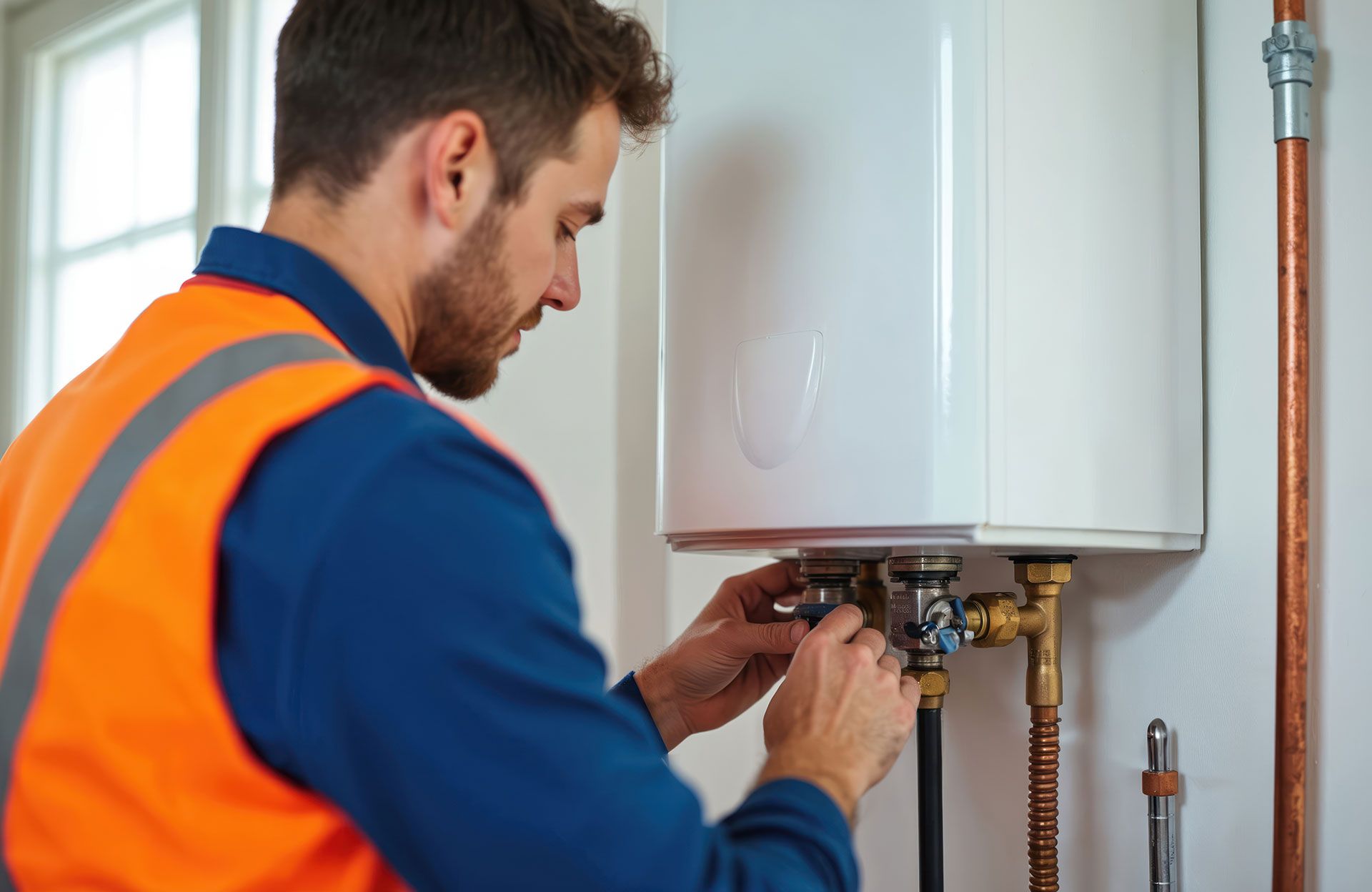5 Signs Your Water Heater Is About to Fail
(And What to Do Right Now)
When your gas hot water heater stops working in your Chesapeake home, it's often too late for preventive action. But what if you could spot the warning signs weeks or even months before complete failure? Understanding these early indicators can save you from emergency repairs, protect your property from water damage, and help you plan for replacement on your terms rather than during a crisis.
Living in coastal Virginia means your water heater faces unique challenges from salt air, humidity, and mineral-rich water that accelerate wear and tear. Recognizing these warning signs becomes even more critical when environmental factors work against your equipment daily.

Why Your Water Temperature Becomes Unpredictable
Your water heater should provide consistent hot water at the temperature you've set. When you start experiencing lukewarm showers despite turning up the thermostat, or when water temperature fluctuates dramatically during use, your water heater is sending you a warning signal.
You might wonder, "Why is my gas water heater not working properly with temperature?" In coastal Virginia, several factors contribute to temperature problems. Salt air corrodes gas valves and thermostats faster than in inland areas. Mineral deposits from Hampton Roads water accumulate on heating elements and sensors, disrupting their ability to maintain consistent temperatures.
What you can do right now: Check your thermostat setting first—it should be around 120°F for optimal performance and safety. If the setting is correct but temperatures remain inconsistent, this indicates internal component failure requiring professional water heater repair in Chesapeake.
Professional vs. DIY: Temperature fluctuations that persist after checking thermostat settings require professional diagnosis. Attempting to adjust gas valves or replace thermostats yourself creates serious safety risks including gas leaks and carbon monoxide exposure.
When Strange Noises Signal Trouble Ahead
A properly functioning water heater operates quietly. When you start hearing popping, rumbling, or banging sounds, your unit is struggling with internal problems that will only worsen over time.
These noises typically indicate sediment buildup from mineral-rich coastal water. As water heats, trapped sediment creates steam bubbles that make popping sounds as they escape. Rumbling noises suggest your heating element is working overtime to heat water through accumulated debris.
Immediate action steps: Listen carefully to identify when noises occur—during heating cycles, when hot water is being used, or continuously. Document the frequency and intensity of sounds, as this information helps technicians diagnose problems more efficiently.
Here's what matters in coastal areas: Virginia Beach water contains higher mineral content than many regions, causing faster sediment accumulation. Combined with humidity that promotes corrosion, these noises often indicate more extensive internal damage than in drier climates.
Water Around Your Water Heater (Even Small Amounts)
Any water around your water heater deserves immediate attention. Many homeowners dismiss small puddles as condensation, but in coastal Virginia's humid environment, distinguishing between normal condensation and actual leaks becomes critical.
Where to look: Check around the base of your unit, near pipe connections, and around the pressure relief valve. Even small amounts of water can indicate failing seals or developing cracks that will worsen rapidly in humid conditions.
Emergency vs. regular service decision: Active leaking that creates puddles or threatens to damage your property constitutes an emergency requiring immediate professional response. Slight moisture that appears occasionally may qualify for scheduled service, but don't wait more than a few days to have it assessed.
Coastal Virginia considerations: High humidity can accelerate tank corrosion and seal failure. What starts as minor moisture can quickly become major flooding, especially during summer months when humidity peaks.
Your Hot Water Supply Runs Out Much Faster
When your family's hot water usage hasn't changed but you're running out of hot water during normal activities, your water heater's capacity is compromised. This often indicates sediment buildup reducing your tank's effective volume or heating element problems preventing proper water heating.
Quick assessment: Think about your household's hot water patterns. If two showers used to work fine but now the second person gets cold water, or if your dishwasher cycles leave you without hot water for other needs, your unit is losing efficiency.
Here's why capacity decreases: Sediment settles at the bottom of your tank, displacing water and insulating the heating element from the water it needs to heat. In coastal areas, this process accelerates due to mineral content and corrosion that creates internal debris.
Professional evaluation needed: Capacity issues require professional diagnosis to determine whether flushing can restore performance or if internal damage necessitates replacement. Attempting to resolve capacity problems yourself often worsens the situation.
Rusty or Discolored Water from Hot Taps
When hot water comes out brown, orange, or with metallic particles, your water heater tank is corroding internally. This is particularly common in coastal Virginia where salt air accelerates metal deterioration.
Immediate testing: Run hot water from multiple fixtures to determine if discoloration affects all hot water or just specific taps. If all hot water shows discoloration, your water heater tank is likely the source.
Health and safety concerns: While rusty water isn't immediately dangerous, it indicates advanced corrosion that will worsen rapidly. Internal tank damage cannot be repaired—replacement becomes necessary when corrosion reaches this stage.
Coastal acceleration factors: Salt air penetrates homes and accelerates metal corrosion beyond normal rates. Water heaters in coastal Virginia typically show rust signs 2-3 years earlier than units in inland areas.
What to Do Right Now: Your Action Plan
When you notice any of these warning signs, taking immediate appropriate action can prevent emergency situations and help you maintain control over timing and costs.
Immediate safety steps: Turn off gas supply if you smell gas, stop using hot water if you notice active leaks, and document all symptoms with photos when possible for professional assessment.
Emergency vs. scheduled service guidelines: Call for emergency water heater repair service in Chesapeake if you have gas odors, active flooding, or complete loss of hot water. Schedule regular service for temperature inconsistencies, minor noises, or slight efficiency decreases.
When you're wondering "who do I call for water heater repair," contact licensed, insured professionals with coastal Virginia experience. Look for companies that understand salt air challenges and stock marine-grade replacement parts designed for coastal conditions.
Making Smart Repair vs. Replacement Decisions
Understanding when repair makes sense versus replacement helps you avoid throwing money at a failing unit while ensuring you don't replace equipment prematurely.
Repair makes sense when: Your unit is under 8 years old, problems are isolated to single components, and repair costs stay under 50% of replacement cost.
Replacement becomes wise when: Multiple warning signs appear simultaneously, your unit exceeds 10 years old, or repairs approach half the cost of new equipment.
Coastal Virginia factors: Units in salt air environments typically need replacement 2-3 years earlier than manufacturer estimates. Factor this into your decision-making process.
Planning Ahead Protects Your Investment
Proactive homeowners who recognize these warning signs early gain significant advantages in timing, cost control, and preventing property damage.
Seasonal considerations: Plan major water heater work during milder months when demand for emergency services decreases. Hurricane season creates additional stress on aging units, making pre-storm assessment wise.
Budget planning: When you spot early warning signs, start researching replacement options and gathering quotes. This preparation prevents rushed decisions during actual failures.
Maintenance advantages: Professional annual maintenance helps identify developing problems before they become emergencies, extending equipment life and preventing costly surprises.
Professional Help When You Need It
Recognizing these warning signs empowers you to make informed decisions about your water heater before crisis strikes. At 911 Home Repair Specialists, we understand coastal Virginia's unique challenges and provide honest assessments that help you choose between repair and replacement based on your specific situation.
Call 757-910-0911 for professional water heater service throughout Chesapeake and Hampton Roads. Our veteran-owned team provides transparent pricing, quality workmanship, and the coastal expertise your home deserves.
Ready to schedule your plumbing service?


